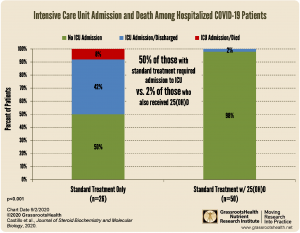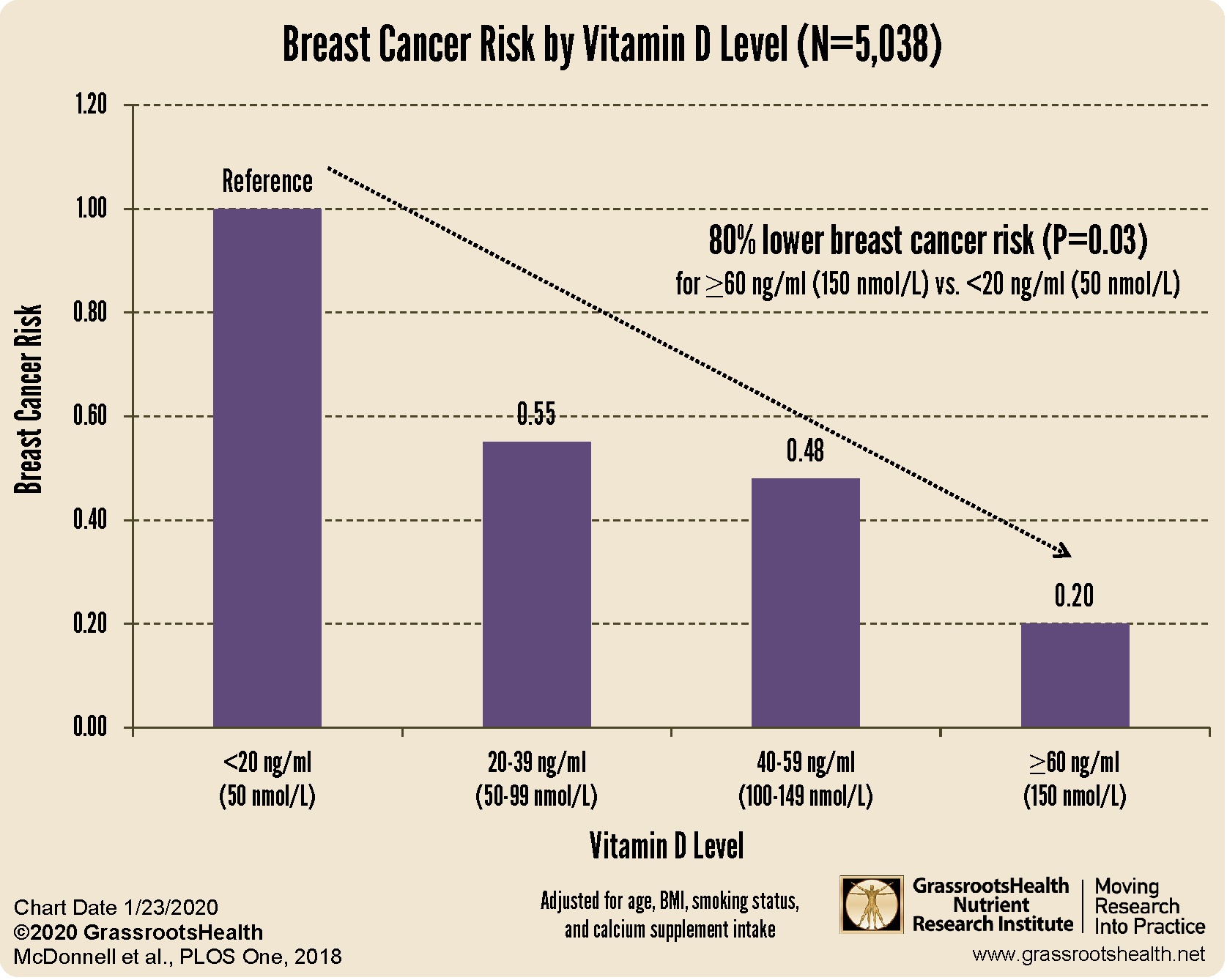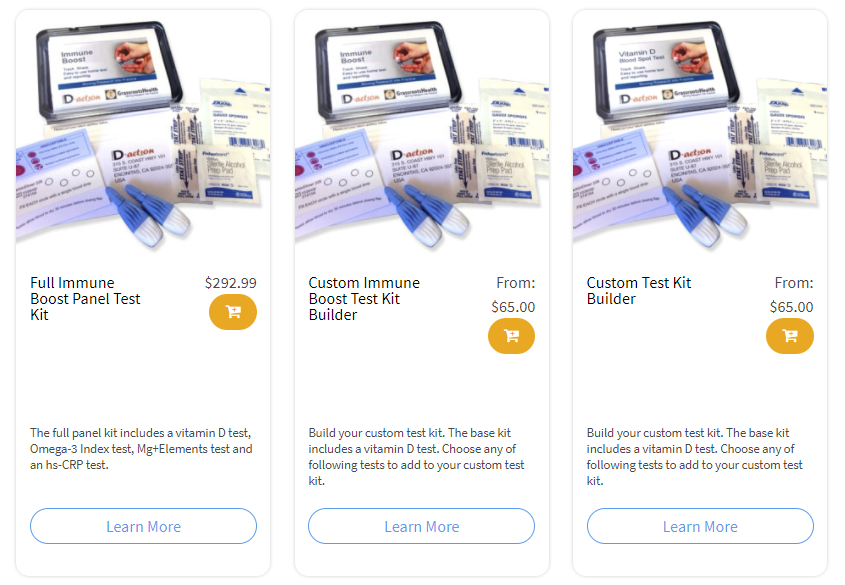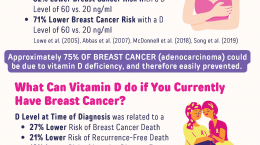Published on October 13, 2020
Women with vitamin D levels at or above 60 ng/ml had an 80% lower risk of breast cancer than women with levels less than 20 ng/ml
 In previous blogs we summarized the results from a 2018 paper published by GrassrootsHealth that assessed the relationship between vitamin D level and breast cancer risk among women aged 55 years and older. In the first post of this series, we showed that there was an 82% lower rate for women with vitamin D levels at or above 60 ng/ml (150 nmol/L) compared to women with levels less than 20 ng/ml (50 nmol/L). In the second post, we discussed another analysis from the paper that showed percent of participants with breast cancer was 78% lower for women with vitamin D levels at or above 60 ng/ml compared to women with levels less than 20 ng/ml.
In previous blogs we summarized the results from a 2018 paper published by GrassrootsHealth that assessed the relationship between vitamin D level and breast cancer risk among women aged 55 years and older. In the first post of this series, we showed that there was an 82% lower rate for women with vitamin D levels at or above 60 ng/ml (150 nmol/L) compared to women with levels less than 20 ng/ml (50 nmol/L). In the second post, we discussed another analysis from the paper that showed percent of participants with breast cancer was 78% lower for women with vitamin D levels at or above 60 ng/ml compared to women with levels less than 20 ng/ml.
In today’s post we will look at the third analysis from that paper which quantified the association between vitamin D level and breast cancer risk after adjusting for age, BMI, smoking status, and calcium supplement intake. As shown on the chart below, this analysis revealed that women with vitamin D levels at or above 60 ng/ml had an 80% lower risk of breast cancer than women with levels less than 20 ng/ml (P=0.03).
Three Analyses – Similar Results!
All three analyses showed similar results – higher vitamin D levels were associated with decreased breast cancer risk, with levels at or above 60 ng/ml being the most protective!
Additionally, since breast cancers diagnosed in the first year were likely present but undiagnosed at the beginning of the study, we also repeated the analysis with only those without breast cancer at one year. We found that those with vitamin D levels at or above 60 ng/ml had a 93% lower risk of breast cancer compared to women with levels less than 20 ng/ml (P=0.02).
Do you know your vitamin D level? Take action now to reach your target vitamin D level; start by finding out where your level is at today.
Many other studies have also been published showing a decreased risk of breast cancer associated with a higher vitamin D level! A summary of this research can be found on our Breast Cancer Prevention Study project page.
Stay tuned over the rest of the month of October for more information on vitamin D and other nutrients that may help reduce the risk of breast cancer.
Are Nutrient Deficiencies Hindering Your Immune System?
Nutrients work synergistically in order to carry out specific functions within the body. For example, we have recently discussed how different immune cells rely on a variety of nutrients, including vitamins D, C, B6, B12, zinc, and magnesium, in order to carry out their actions in an immune response. Without these necessary nutrients, immune function may be hindered.
Could a nutrient deficiency be putting a damper on your immune response? Find out by testing your vitamin D, omega-3s, magnesium and other essential elements (including selenium), as well as your inflammation levels, with the new Immune Boost home test kit offered by GrassrootsHealth. Measuring levels is the only way to know if you are supporting your immune system and whether additional changes should be made, with supplementation, dietary changes, or both.
Enroll now with the Full Immune Boost Panel (which includes tests for vitamin D, Omega-3 Index, magnesium, zinc, selenium, copper, and hsCRP), and get 10% off when you use coupon code BoostTen at checkout.
What Does it Take YOU to Get Your D to 40 ng/ml (100 nmol/L)?
Did you know your health could be greatly affected by making sure you have a vitamin D level of at least 40 ng/ml (100 nmol/L)? Help us help you.
STEP 1 – Do you know what your vitamin D level is? If not, be sure to test today to find out.
STEP 2 – Determine your target level. Are you at your target level? Experts recommend a level of at least 40-60 ng/ml (100-150 nmol/L).
STEP 3 – Need to boost your level? Use the D*calculator to see how much vitamin D it may take to reach your target. Opt for the Loading Dose for a quicker boost.
STEP 4 – Optimize how your body absorbs and utilizes vitamin D with co-nutrients and these simple steps.
STEP 5 – Re-Test! This is an important step to make sure you have reached your target level, and to ensure you are not taking too much! Re-testing after 3-4 months is recommended.
STEP 6 – Adjust, Repeat…
Give your immune system the nutrients it needs to support a healthy you and protect yourself from unnecessary diseases, especially COVID-19.
NEWS ALERT
 The first Randomized Controlled Trial on vitamin D and COVID-19 has shown a 96% lower risk of ICU admission for those receiving vitamin D (as 25(OH)D to quickly boost vitamin D blood levels) along with the standard treatment, compared to those receiving standard treatment alone.
The first Randomized Controlled Trial on vitamin D and COVID-19 has shown a 96% lower risk of ICU admission for those receiving vitamin D (as 25(OH)D to quickly boost vitamin D blood levels) along with the standard treatment, compared to those receiving standard treatment alone.
These results support many previous observational studies showing a relationship between vitamin D levels and intake and COVID-19 severity.
Review the Latest Nutrient Research for COVID-19
GrassrootsHealth Nutrient Research Institute has launched the new Immune Boost project with the use of our myData-myAnswers nutrient health system that nearly 15,000 people are already using for their health. Specific markers that influence immune health are suggested for testing as part of this project including:
- Vitamin D
- Omega-3 Index
- Essential elements magnesium, selenium, and zinc
- hsCRP
Our goal is to demonstrate how one can use the Nutrient Research Model established by Dr. Robert Heaney to show the effect of vitamin D serum levels of at least 40 ng/ml (100 nmol/L) on risk reduction for all ethnicities in the population. Status and intake of other nutrients will also be analyzed for any type of relationship to immune status and symptom severity. Join the project today!
Please let us know if you’re interested in helping sponsor this project.
Through GrassrootsHealth Nutrient Research Institute, you can also test your essential elements magnesium, copper, zinc and selenium, toxins such as lead, mercury and cadmium, as well as your omega-3 levels, inflammation levels and thyroid stimulating hormone (TSH) level. Find out your levels today! Log on to the test selection page (click the link below) to get your tests and see for yourself if your levels can be improved.
Make sure you track your results before and after, about every 6 months!
Click Here to Access the Test Page
How can I track my nutrient intake and levels over time?
To help you track your supplement use and nutrient levels, GrassrootsHealth has created the Personal Health Nutrient Decision System called
For each specific supplement, you can track what days you take it, how much, and many other details. This will help you know your true supplemental intake and what patterns of use work for you to reach and maintain optimum nutrient levels. Check it out today!










